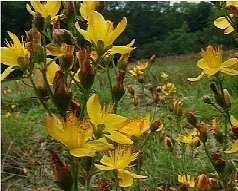|
The
Woodland Education Centre |
|
|
The
Woodland Education Centre |
|
Ecological Surveys 1996 - 1998
The Indirect Effects of Brushcutting |
Slender St.
John’s-wort (Hypericum pulchrum) -
(picture, left) was widely distributed over the
project site initially. It was the fourth most dominant species in 1996 (Table).
In subsequent years it has steadily declined in abundance. This may be a direct result of brush cutting, or may be an indirect effect, resulting from increased competiton with other species, particularly the grasses. |
| Slender St. John’s-wort was widely distributed over the site
initially. Its distribution on the site was very central in 1996, being concentrated in section 5 and decreasing outwards from this central point (Figures below). In subsequent years it steadily declined in abundance and its distribution became more skewed towards the northern areas of the project site. The decline does not appear to show any patterns corresponding to any of the management regimes. It may be a consequence of brushcutting, either directly, or indirectly through consequential changes in environmental conditions, or increasing competition with other species such as grasses. |
|
|
Mean % cover of St. John’s-wort. 1996 -1998 |
% Frequency of St. John’s-wort 1996 - 1998 |
Continue to The timing of
brushcutting![]()
Ecological Surveys 96 - 98 |